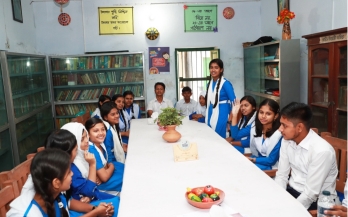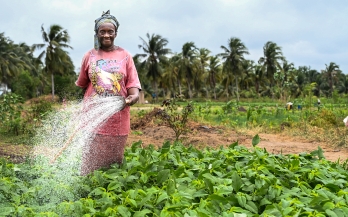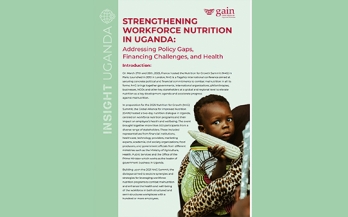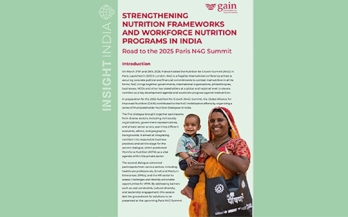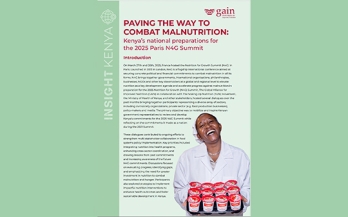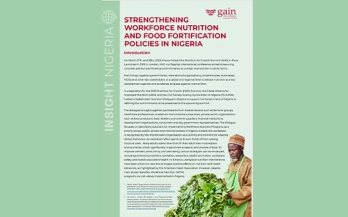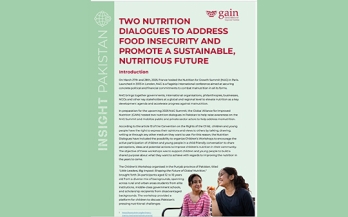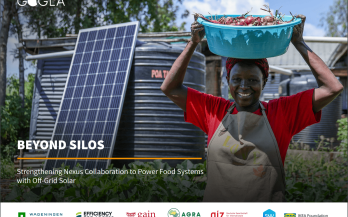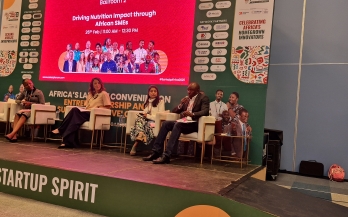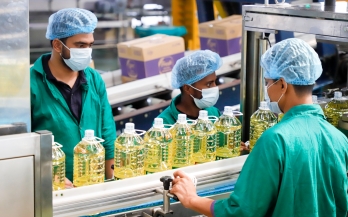- 10/04/2025
While there is a growing recognition of the importance of youth engagement in food system decision-making and governance, existing research remains largely theoretical or anecdotal, with a scarcity of empirical studies providing robust data on the engagement and meaningful participation of young people in food systems. A first step towards providing such data is having strong, validated metrics and data-collection methods that can be applied comparably across contexts. This scoping review thus synthesises evidence on metrics and methods used to assess youth engagement in policy processes, with a specific focus on food system-related policies.
From March 27 to 28, 2025, The Government of France hosted the 2025 Nutrition for Growth (N4G) Summit in Paris. The N4G Summit is an international conference dedicated to defeating all forms of malnutrition by bringing together governments, international organisations, philanthropies, businesses, NGOs and other key stakeholders. Its objectives are to elevate nutrition as a key priority on the global development agenda and secure concrete political and financial commitments to accelerate progress against malnutrition.
In alignment with its mission to enhance nutrition outcomes by improving the consumption of nutritious and safe food for all people, GAIN registered two new commitments under the Nutrition Accountability Framework (NAF) to ensure accountability in achieving its objectives. These commitments build upon those that GAIN initially registered at the 2021 Tokyo N4G Summit.
- 09/04/2025
On March 27th and 28th, 2025, France hosted the Nutrition for Growth Summit (N4G) in Paris. Launched in 2013 in London, N4G is a flagship international conference aimed at securing concrete political and financial commitments to combat malnutrition in all its forms. N4G brings together governments, international organisations, philanthropies, businesses, NGOs and other key stakeholders at a global and regional level to elevate nutrition as a key development agenda and accelerate progress against malnutrition. In preparation for the 2025 Nutrition for Growth (N4G) Summit, the Global Alliance for Improved Nutrition (GAIN) hosted a two-day nutrition dialogue in Uganda, centred on workforce nutrition programs and their impact on employee’s health and wellbeing.
- 09/04/2025
On March 27th and 28th, 2025, France hosted the Nutrition for Growth Summit (N4G) in Paris. Launched in 2013 in London, N4G is a flagship international conference aimed at securing concrete political and financial commitments to combat malnutrition in all its forms. N4G brings together governments, international organisations, philanthropies, businesses, NGOs and other key stakeholders at a global and regional level to elevate nutrition as a key development agenda and accelerate progress against malnutrition.
- 09/04/2025
On March 27th and 28th, 2025, France hosted the Nutrition for Growth Summit (N4G) in Paris. Launched in 2013 in London, N4G is a flagship international conference aimed at securing concrete political and financial commitments to combat malnutrition in all its forms. N4G brings together governments, international organisations, philanthropies, businesses, NGOs and other key stakeholders at a global and regional level to elevate nutrition as a key development agenda and accelerate progress against malnutrition.In preparation for the 2025 Nutrition for Growth (N4G) Summit, The Global Alliance for Improved Nutrition (GAIN) in collaboration with The Scaling Up Nutrition (SUN) Movement, the Ministry of Health of Kenya, and other stakeholders, hosted several dialogues over the past months bringing together participants representing a diverse array of sectors, including civil society organizations, private sector (e.g. food production businesses), policy-makers and media. The primary objective was to mobilize and inspire Kenyan government representatives to review and develop Kenya's commitments for the 2025 N4G Summit while reflecting on the commitments it made as a nation during the 2021 Summit.
- 09/04/2025
On March 27th and 28th, 2025, France hosted the Nutrition for Growth Summit (N4G) in Paris. Launched in 2013 in London, N4G is a flagship international conference aimed at securing concrete political and financial commitments to combat malnutrition in all its forms. N4G brings together governments, international organisations, philanthropies, businesses, NGOs and other key stakeholders at a global and regional level to elevate nutrition as a key development agenda and accelerate progress against malnutrition. In preparation for the 2025 Nutrition for Growth (N4G) Summit, the Global Alliance for Improved Nutrition (GAIN) and the Civil Society Scaling Up Nutrition in Nigeria (CS-SUNN) hosted a Stakeholder Nutrition Dialogue in Nigeria to support the Government of Nigeria in defining the commitments to be presented at the upcoming summit.
- 09/04/2025
On March 27th and 28th, 2025, France hosted the Nutrition for Growth Summit (N4G) in Paris. Launched in 2013 in London, N4G is a flagship international conference aimed at securing concrete political and financial commitments to combat malnutrition in all its forms.
N4G brings together governments, international organisations, philanthropies, businesses, NGOs and other key stakeholders at a global and regional level to elevate nutrition as a key development agenda and accelerate progress against malnutrition. In preparation for the upcoming 2025 N4G Summit, the Global Alliance for Improved Nutrition (GAIN) hosted two nutrition dialogues in Pakistan to help raise awareness on the N4G Summit and mobilize public and private sector actors to help address malnutrition.
- 08/04/2025
This white paper explores the nexus between food systems, infrastructure and energy provided by off-grid solar (OGS) systems.8, 9, 10 The efficiency, sustainability, and productivity of food systems are deeply intertwined with energy use.11 The agricultural sector accounts for 30% of global energy consumption and requires power for food production, storage, transportation and processing. The infrastructure used to power food systems is heavily reliant on fossil fuels, accounting for at least 15% of fossil fuel use globally.12 However, in sub-Saharan Africa, agricultural production consumes significantly less energy than the global average. This limits opportunities for value addition, increases food waste due to inadequate storage and processing facilities, and contributes to low agricultural yields.
Fighting malnutrition in all its forms is one of the major challenges of the 21st century. While more than 820 million people suffer from undernutrition and hunger, with 150 million children under age 5 stunted (too short for their age), another 2 billion people are overweight or obese. With SMEs in Africa producing and distributing approximately 70%-80% of the nutritious foods available on the continent, they are key drivers of food supply, job creation and economic growth. How can they reach lower-income consumers and create sustainable nutrition impact?
- 03/04/2025
Food systems, important for food security, nutrition, prosperity, and environmental well-being, are integral to all 17 Sustainable Development Goals. Traditional food markets are strategic entry points for food systems transformation, since a diversity of stakeholders (including local producers, vendors, consumers, and government), interact routinely in these spaces. These markets connect millions of stakeholders within and across local food systems and levels of government mandates. As food-insecure regions like sub-Saharan Africa (SSA) rapidly urbanise, most urban, low-income, vulnerable communities are reliant on food purchased from markets. As such, markets are key spaces to guide vendor practices, influence consumer food choices, and strengthen inclusive governance. Despite their critical value, markets’ ‘hard’ (structures and equipment) and ‘soft’ (capacities and resources) infrastructure are significantly under-supported. Investment efforts have been challenged by a lack of understanding of how markets are embedded in the wider food system and markets’ wholesale and retail dynamics, inadequate financial models, insufficient public budgets and capacity, and limited empowerment of key stakeholders.
This paper introduces and illustrates GAIN’s Inclusive Food Systems Governance Model and supporting tools. The model is designed to strengthen investment and empower voices, alongside increased efforts to ensure sustainability and resilience in traditional food markets. It has been shown to support effective market infrastructure investments, to foster local agency and inclusive and equitable food systems transformation, and to be adaptable across different contexts. The case of Marikiti Market, Machakos County (Kenya) shows the model in action, including details of specific investment components and costs. As infrastructure investments are limited, the importance of making a sound business investment case for public and private (and philanthropic) partnerships and banks to invest in traditional markets is critical.
